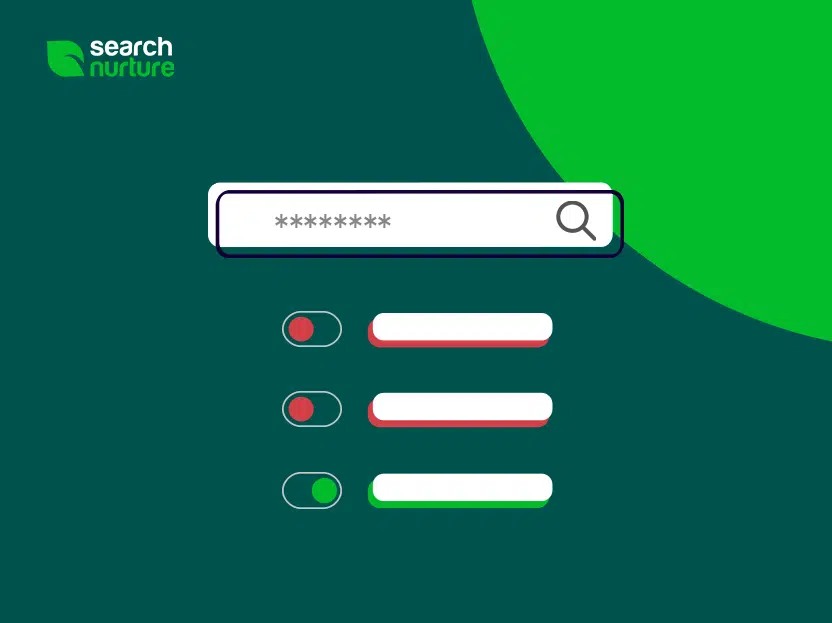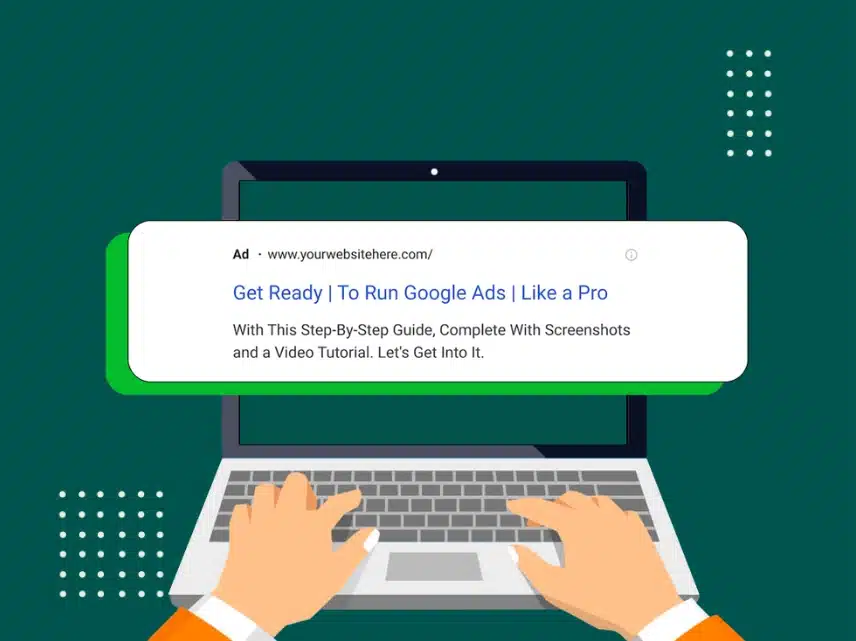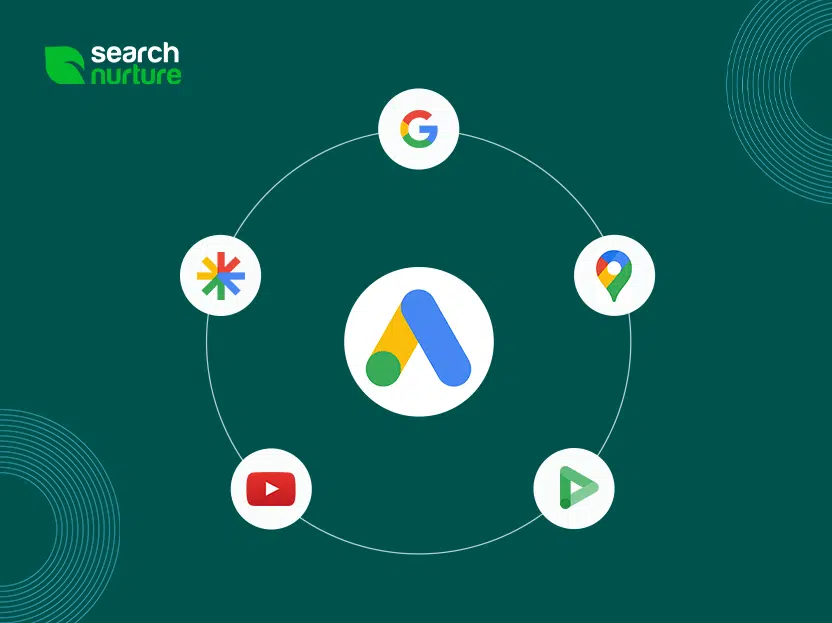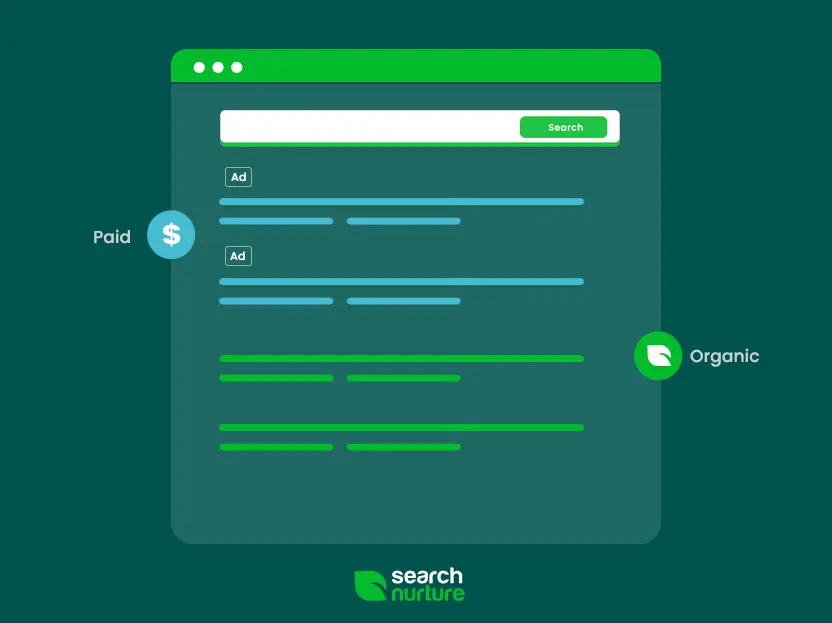You’ve created your campaign, waited for a couple of weeks to see how it does, and are ready to optimize it. Naturally, you want to see which keywords are performing best and which are costing you money without bringing in any sales. So, you open your Dashboard, raise your sleeves, and jump right into it.
Sounds simple enough, doesn’t it? Just pause any underperforming keywords and you’re done.
Or are you?
If it were this simple to optimize your Google Ads keywords, Google would have surely automated the whole process by now. They would probably ask you for a target CTR or Cost Per Click (CPC) and take care of everything.
The success of your Google Ads campaigns depends largely on the keywords you use. These let you identify the right audience and tailor your message to it.
Marketers often suggest you try multiple keywords, wait to see how they perform, and pause underperforming ones. But how do you know which are the underperforming keywords? And how long should you wait before you pause them?
In this article, we’ll discuss:
- Defining your Google Ads campaign strategy
- Creating your Marketing Funnel
- The distinctions between pausing and removing keywords
- When you should pause keywords
- Why you should pause keywords
- Developing a system to measure Google Ads keyword performance
Define Your Google Ads Campaign strategy
The reason they haven’t done that is that it’s never that simple.
Before you start culling keywords like weeds in your prized rose garden, you should know what to look for in the first place. Maybe some of these keywords need a little more time and will cost you lots of money in lost revenue in a month’s time. Or, perhaps, some keywords bring in valuable impressions, raising brand awareness.
Identifying underperforming keywords can be tricky. For example, let’s say you are a wedding photographer. If you use the word “photographer” as a keyword, you will get millions of Impressions, as it is a generic term that many people search for. How many of them are looking for a wedding photographer in particular?
It’s even worse if you use “wedding,” as you’ll get people interested in anything from wedding invitations to wedding receptions.
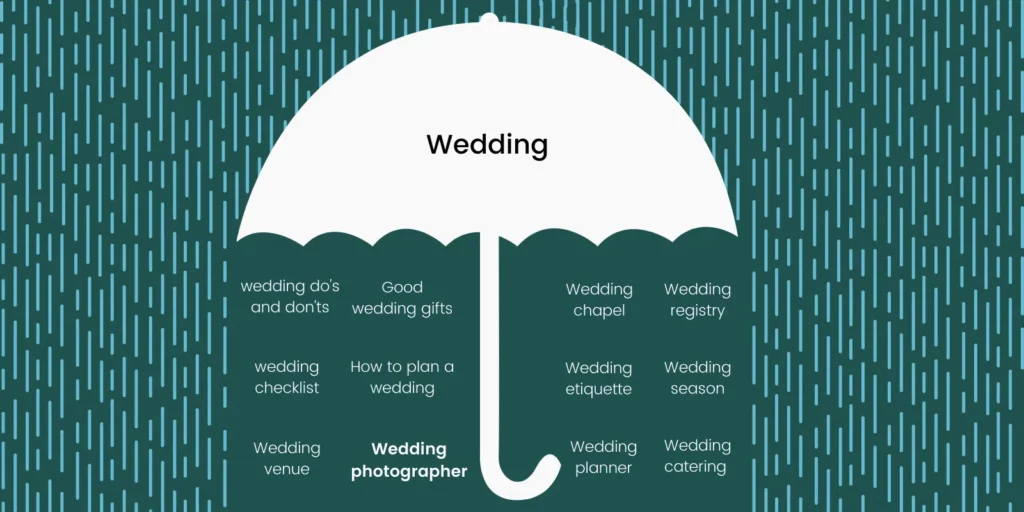
However, should you pause these keywords altogether? They are, after all, what you do; aren’t they?
In some ways, knowing how to phrase and when to pause your Google Ads keywords is more of an art than a science. Of course, that is not to say you need to burn some incense and meditate before opening your Dashboard. Rather, it has to do with getting a better understanding of what you’re trying to achieve.
In other words, knowing when to pause your keywords depends on your marketing strategy.
The Marketing Funnel
When we set up an Ad campaign, we don’t jump right into profitability—much as we’d love that. Unfortunately, profitability is only possible when we have a clearly defined audience and a killer message tailored to this group. In other words, we need an effective marketing funnel. This is where an experienced agency comes in. They create the right marketing funnel for you to ensure the best possible outcome.
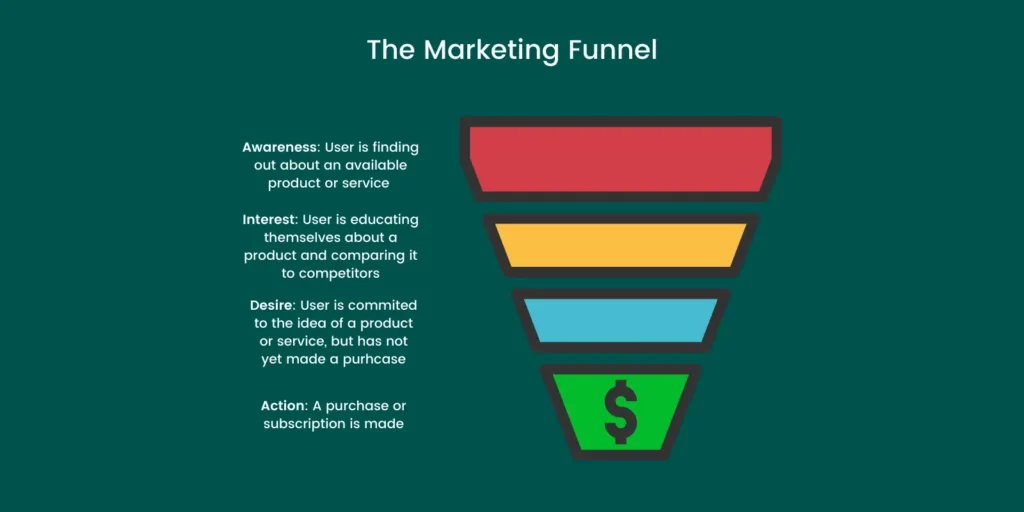
To create our marketing funnel we have to follow three steps. Which step we’re setting up the Ads for will define what we want to do about our keywords.
Step 1: Identify Your Audience
Identifying your target audience is key to your campaign’s success. If you have the right audience, people who are actively seeking out your product or service, you have a much better chance of convincing them to buy from you. Otherwise, it’s an uphill struggle.
The most obvious way to define your audience is keywords: you target those who enter certain keywords or keyphrases into Google. However, you can also use geographic and demographic criteria such as gender, earnings, etc. to narrow down your audience.
During this exploratory stage, you must be willing to accept losses as you continuously try out different keywords and strategies. You should be conservative in your keyword culling and err on the side of caution before pausing a keyword lest you pause them before they’ve had a chance to prove their worth.
Step 2: Promote to Warm Audiences
Once you have a defined audience, things are much better. Your target audience is a warm audience, i.e. people who are already interested in what you’re selling. These lovely people are the lowest-hanging fruit. As long as you are offering a decent product or service at a reasonable price, you should find it pretty easy to convert them into buyers.
All you need to do is run a neverending series of A/B tests with different Ads and keywords and see which ones work best. During this stage, you should liberally pause (and restart) keywords. Conduct regular Google Ads audits and test and test again.
Step 3: Expand to Similar Audiences
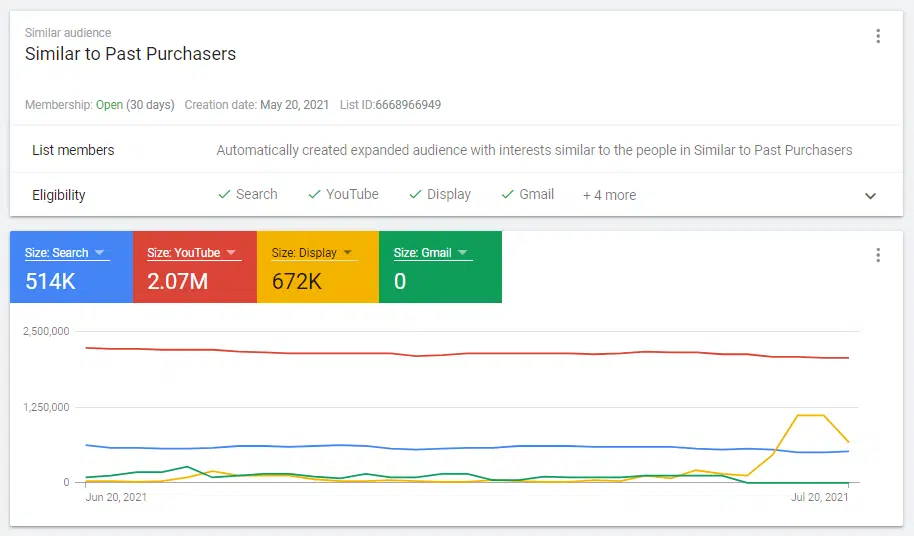
Screenshot of Google Ads Similar Audiences.
Once you have a clearer idea of your audience, Google lets you target new users with similar characteristics to your site visitors. Chances are that at least some of the people in your similar audiences can be converted into buyers. This type of audience also lets you increase your brand awareness, thus getting more out of your Google Ads budget.
Step 4: Remarketing
After you have built a strong customer base, you’ll need to expand on it by turning buyers into loyal, repeat customers. This requires remarketing.
Use remarketing to push your audiences deeper into your sales funnel. Target them with Ads to remind them of your brand and reposition products they have shown an interest in.
As for keywords, remarketing Ads build their audience using site visitors so you don’t need to worry about keywords. However, search campaigns created using RLSA (Remarketing Lists for Search Ads) are particularly focused and targeted than Search campaigns that target broader audiences. This lets you, for example, bid on more broad keywords only for people who have previously purchased from your site.
Should You Pause Your Keywords or Remove Them?
There are several reasons why you should never remove your keywords.
First of all, paused keywords may yet be useful in the future when you wish to check their performance. Even the worst-performing keywords can be useful in this context, as they let you see what went wrong and save you from testing the same keywords again.
For example, imagine you have set up a campaign a couple of years ago promoting your wedding photography services. One of your clients suggests you try “wedding” as a keyword. In fact, you had already tried it when you had first set it up. It hadn’t worked out because it had led to many Impressions but few Clicks, so you had deleted it. Now, you may remember this or you may have forgotten – in which case you are about to spend money on a keyword that is doomed to fail.
Also, by pausing your keywords you can still try them again in different scenarios. Seasonality would be a good example:
Let’s say a keyword performed poorly in the winter but will actually do quite well in summer. If you remove it, you have no way of testing its performance during different time periods, times of the day, etc.
In our photographer’s example, you may have used “outdoor photography” as a keyphrase. Naturally, this won’t be as popular in winter as in summer. However, you have no idea which months are the best for your “outdoor photography” Ads unless you run them for a whole year and compare the data month by month.
When Should You Pause Google Ads Keywords?
When choosing which keywords to pause, you need to be careful and evaluate your goals for each keyword. You can also mix and match. Have some keywords specifically created for impressions and others designed for sales. By catching a customer in every part of your sales funnel, you maximize your campaign’s chances of success.
There is also a high-class problem you may run into: that of having to pause your entire campaign because you have so much interest in your products or services that you have to slow things down. If your Ads have outgrown your ambition, it may be time to hit the pause button.
In general, though, you should follow the following rules-of-thumb:
- If you are looking to maximize brand awareness, you must focus on Impressions. You should pause keywords that have few Impressions.
- If it is traffic you are interested in, you should focus on Clicks and your Click-Through Rate (CTR). A keyword that has few Clicks and/or a low CTR is a candidate for pausing.
Finally, if you are keen on sales, you should look out for Ads with a lot of Impressions and Clicks but no Conversions. This could mean that the Ad is working just fine but the landing page fails to convert. Perhaps the landing page is poorly designed. Or your product has too many negative reviews, is too expensive, or is otherwise unappealing. However, it may also be that you are targeting the wrong audience. If that’s the case, then you should redefine your marketing funnel and switch to keywords that are more appropriate to your core audience.
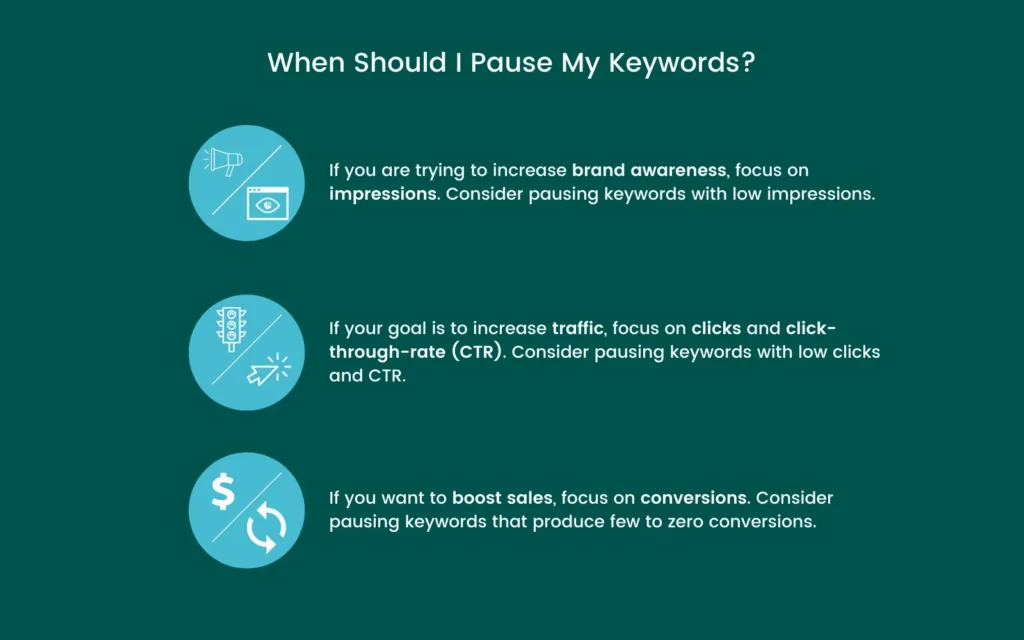
Last but not least, if you have specific goals to meet for cost per lead then you should consider pausing keywords when these are above your KPI goals. Keep in mind we recommend you review all aspects of keyword performance including but not limited to search terms, page position, CTR, and landing page experience.
For example, if your keyword is above your expected cost per lead try reviewing searches that might be spending too much but not converting excluding those as negative keywords can help you reach your CPA goal and prevent you from unnecessarily pausing your keyword. Once you have tried all the recommendations and optimizations for that keyword and your cost per lead is still above goal then pause it and focus on your top keywords moving forward.
Let’s explore all three of these in detail below.
Maximize Brand Awareness
In a sense, this is the easiest scenario. If a keyword is generating a lot of Impressions, then a lot of people see it. You are generating brand awareness and expanding your audience reach. This is the sort of keyword you want to keep around for as long as possible. Any keyword that fails to get any Impressions should be paused.
Of course, if you spot any keywords that not only generate Impressions but also have a lot of Clicks, then even better!
Maximize Clicks & CTR
Most people running Ads focus on Clicks to determine an Ad’s success. After all, Clicks bring people to your website or eshop. The more Clicks you have, the better; right?
Well, yes—up to a point.
For example, you can increase your Clicks by ignoring your Cost Per Click (CPC) and bidding exorbitant amounts for each Click. However, if you are selling a product that’s worth $10 and you spend twice as much on each Click, you’re on the path to financial ruin.
So, you also need to take into account how high your maximum bid is.
You should also take into account your Click-Through Rate (CTR). Say it takes one of your keywords a million people to see your Ad for one of them to Click. You also have another keyword, only it takes only ten people to see it before one Clicks. Which keyword will you pause?
Finally, Clicks spend your money. What makes you money is sales; i.e. Conversions. Shouldn’t you really be taking those into account as well?
Maximize Conversions
At the end of the day, most people run Ads to sell their products or services. It doesn’t matter if every single person on Earth has visited your eshop if none of them have ever made a purchase. Ideally, what you want is for every person who clicks on your Ad to also reach the coveted checkout page.
Thankfully, Google provides you with a ton of information on Conversions. You can see how many Conversions you have, the value of each of them, its value per Click, etc.
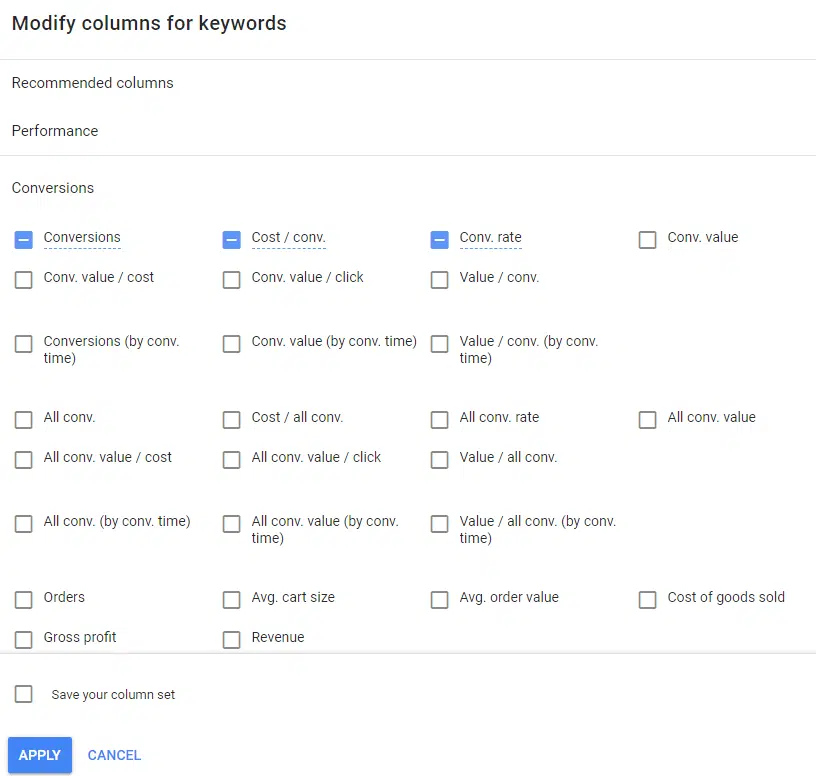
Use this information to choose which keywords to keep and which ones to pause. As long as the cost is not prohibitive, be conservative when pausing keywords that have a high CTR. Sometimes, it may be that keywords are doing a great job of sending people to your landing page but something drives people away once they are there. If this is the case, then the problem lies with your page; not your keywords. Accordingly, your solution will also be there.
You should also ensure you’re not accidentally pausing keywords that drive a lot of later-stage conversions, even though they may fail to be directly credited with a conversion.
Finally, you need to take the keyword’s history into account. It may well be that a keyword that hasn’t performed well in the last week has consistently done so in the past and may well do so again in the near future. Sometimes, factors outside our control have an impact on our Ads’ success and we need to account for that.
Why Should You Pause Your Keywords?
Given that we need to be so careful when choosing which keywords to pause, wouldn’t it be easier to simply leave them be? Once we have removed any keywords that cost us money, surely it can’t hurt to let the rest of them live out a quiet life among the high-performing ones, right?
Well, this is where the Quality Score comes into play.

Some keywords don’t spend much, don’t convert, and have a high Quality Score. That’s fine; we can leave them alone, safe in the knowledge they contribute to our campaign.
However, other keywords that also don’t spend and don’t convert may have a low Quality Score. These ones, we need to pause because they are costing you money indirectly, by raising your overall costs.
When Google chooses which Ads to display and how high your Cost-Per-Click (CPC) will be, it takes into account your campaign’s overall Quality Score. In part, this is determined by your historical, account-wide Quality Score. Having keywords in your account that lower your Quality Score makes it more expensive to push out new keywords.
It would also be a good idea to check which keywords have a high Bounce Rate and pause them if their overall performance is not good. However, you need to be careful: the bounce rate has to do with other factors too, besides keywords. So, check the landing page and the keyword history first before pausing any keywords that have a high bounce rate.
Developing a System to Assess Google Ads Keywords Performance
From the above, it’s probably clear that pausing your keywords is easy. But it’s not always smart. That makes developing a basic system quite hard, especially if you’re not a dedicated marketer with an intuitive grasp of which keywords are failing and which simply need more time.
Having said that, you can follow the process below to assess your keywords:
- Define your strategy.
- If you wish to maximize your brand awareness, focus on Impressions. Pause any keyword with a few of them.
- If you wish to maximize traffic, focus on Clicks and CTR. Any keywords that fail to generate Clicks, have high costs, and have a low CTR should probably be paused.
- If you wish to maximize sales, focus on Conversions. Any keywords that fail to generate Conversions can be paused. However, make sure first it’s not your eshop or landing page that drives customers away.
- Keep out an eye for your keywords’ Quality Score. Keywords with a low-quality Score indirectly adversely affect your overall campaign and may need to be paused.
Alternatively, you can focus on what you do best—run your business—and let Search & Nurture create and run your Ads campaigns. Our vast experience with Google Ads means we have a good understanding of how to reach your target audience and boost your sales.
Your brand deserves a tailored strategy. Contact Search & Nurture today and let us provide you with the right one for you.


